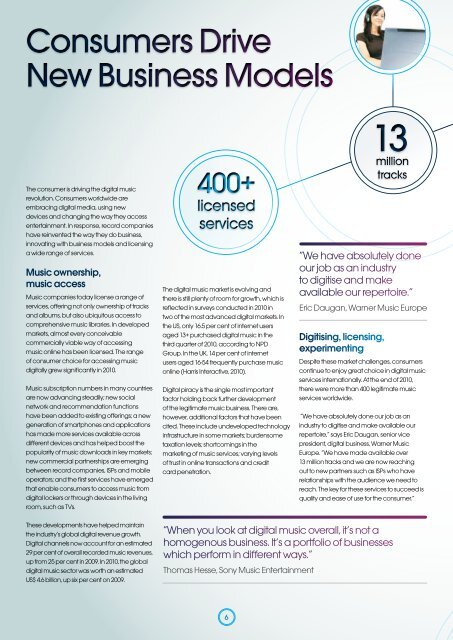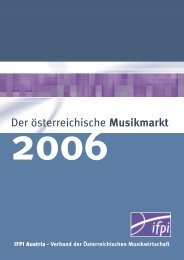IFPI Digital Music Report 2011
IFPI Digital Music Report 2011
IFPI Digital Music Report 2011
Create successful ePaper yourself
Turn your PDF publications into a flip-book with our unique Google optimized e-Paper software.
Consumers Drive<br />
New Business Models<br />
The consumer is driving the digital music<br />
revolution. Consumers worldwide are<br />
embracing digital media, using new<br />
devices and changing the way they access<br />
entertainment. In response, record companies<br />
have reinvented the way they do business,<br />
innovating with business models and licensing<br />
a wide range of services.<br />
<strong>Music</strong> ownership,<br />
music access<br />
<strong>Music</strong> companies today license a range of<br />
services, offering not only ownership of tracks<br />
and albums, but also ubiquitous access to<br />
comprehensive music libraries. In developed<br />
markets, almost every conceivable<br />
commercially viable way of accessing<br />
music online has been licensed. The range<br />
of consumer choice for accessing music<br />
digitally grew significantly in 2010.<br />
<strong>Music</strong> subscription numbers in many countries<br />
are now advancing steadily; new social<br />
network and recommendation functions<br />
have been added to existing offerings; a new<br />
generation of smartphones and applications<br />
has made more services available across<br />
different devices and has helped boost the<br />
popularity of music downloads in key markets;<br />
new commercial partnerships are emerging<br />
between record companies, ISPs and mobile<br />
operators; and the first services have emerged<br />
that enable consumers to access music from<br />
digital lockers or through devices in the living<br />
room, such as TVs.<br />
400+<br />
licensed<br />
services<br />
The digital music market is evolving and<br />
there is still plenty of room for growth, which is<br />
reflected in surveys conducted in 2010 in<br />
two of the most advanced digital markets. In<br />
the US, only 16.5 per cent of internet users<br />
aged 13+ purchased digital music in the<br />
third quarter of 2010, according to NPD<br />
Group. In the UK, 14 per cent of internet<br />
users aged 16-54 frequently purchase music<br />
online (Harris Interactive, 2010).<br />
<strong>Digital</strong> piracy is the single most important<br />
factor holding back further development<br />
of the legitimate music business. There are,<br />
however, additional factors that have been<br />
cited. These include undeveloped technology<br />
infrastructure in some markets; burdensome<br />
taxation levels; shortcomings in the<br />
marketing of music services; varying levels<br />
of trust in online transactions and credit<br />
card penetration.<br />
Digitising, licensing,<br />
experimenting<br />
13<br />
million<br />
tracks<br />
“We have absolutely done<br />
our job as an industry<br />
to digitise and make<br />
available our repertoire.”<br />
Eric Daugan, Warner <strong>Music</strong> Europe<br />
Despite these market challenges, consumers<br />
continue to enjoy great choice in digital music<br />
services internationally. At the end of 2010,<br />
there were more than 400 legitimate music<br />
services worldwide.<br />
“We have absolutely done our job as an<br />
industry to digitise and make available our<br />
repertoire,” says Eric Daugan, senior vice<br />
president, digital business, Warner <strong>Music</strong><br />
Europe. “We have made available over<br />
13 million tracks and we are now reaching<br />
out to new partners such as ISPs who have<br />
relationships with the audience we need to<br />
reach. The key for these services to succeed is<br />
quality and ease of use for the consumer.”<br />
These developments have helped maintain<br />
the industry’s global digital revenue growth.<br />
<strong>Digital</strong> channels now account for an estimated<br />
29 per cent of overall recorded music revenues,<br />
up from 25 per cent in 2009. In 2010, the global<br />
digital music sector was worth an estimated<br />
US$ 4.6 billion, up six per cent on 2009.<br />
“When you look at digital music overall, it’s not a<br />
homogenous business. It’s a portfolio of businesses<br />
which perform in different ways.”<br />
Thomas Hesse, Sony <strong>Music</strong> Entertainment<br />
6



